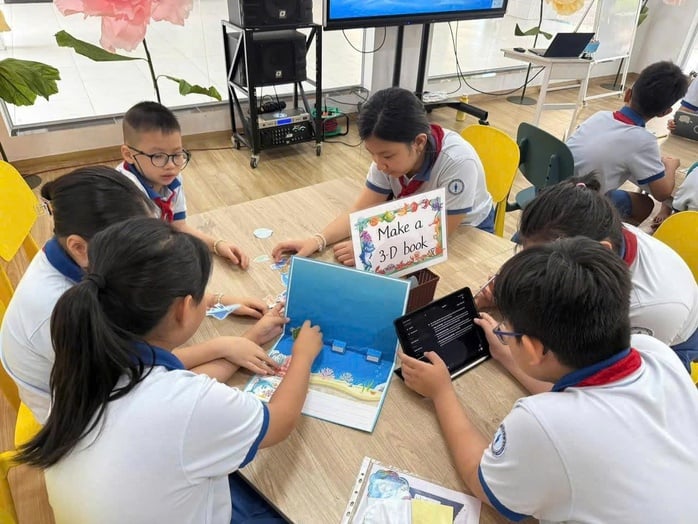Currently, about 15% of schools in major Vietnamese cities are applying artificial intelligence (AI) tools in teaching, with Hanoi reaching approximately 25% and Ho Chi Minh City around 30%. The subjects most supported by AI are mathematics, English, science , and computer science.
Applications at multiple educational levels.
At the workshop "Developing AI Competencies for Learners," recently organized by the University of Social Sciences and Humanities - Vietnam National University, Hanoi, in collaboration with Meta Group, the Vietnam Association for Scientific and Technological Information, and One World Magazine, Professor Le Anh Vinh, Director of the Vietnam Institute of Educational Sciences, stated that a survey was conducted to develop an AI competency framework for learners with over 11,000 junior high school students by the end of 2023.
Among the students who participated in answering the questions, 87% had some level of knowledge about AI, such as approaching it or trying it out in games and learning. The students also rated the use of AI as very effective. The institute also conducted a survey of nearly 35,000 secondary and high school teachers at the end of 2024, and the results showed that 76% of teachers reported using AI in their teaching. The teachers rated the application of AI in teaching as highly effective.
Ms. Nguyen Thi Nhiep, Principal of Chu Van An High School for the Gifted ( Hanoi ), believes there is a disparity between provinces and cities, between urban and rural schools, and between private and public schools. For example, in Hanoi, the application of AI in private schools is very well-organized and systematic. However, in public schools, while they want to incorporate AI training, they face budget constraints. "We are striving to have teachers advise students on the smartest ways to apply AI. Most schools encourage students to use AI, but with some control," said Ms. Nguyen Thi Nhiep. The principal also suggested the need for a legal framework, clear goals, and a roadmap for students, teachers, and schools to apply and develop AI in teaching and learning, limiting the misuse of AI by students that could negatively impact their critical thinking and creativity during the learning process.

Students at Tran Hung Dao Primary School (Cau Ong Lanh Ward, Ho Chi Minh City) are introduced to AI during lessons and club activities. Photo: DANG TRINH
At the university level, a survey of approximately 500 students from various courses at universities in Hanoi showed that 98.9% of respondents reported using AI in their studies or for entertainment. Associate Professor Hoang Minh Son, Director of Vietnam National University, Hanoi, believes that education is the field that will be most strongly impacted and benefit most from the exploitation of AI. Associate Professor Hoang Minh Son emphasized that today's graduates will have very different competency requirements than before. Currently, upon graduation, students need not only methodology but also foundational AI knowledge and digital skills.
Therefore, AI needs to be integrated into the teaching and learning process immediately. This is not only to meet the changing demands of the labor market or job requirements upon graduation, but also to enable students to effectively use and exploit the latest technology in their studies to improve the quality of education.
Developing an AI competency framework.
Professor Le Anh Vinh informed that the AI program is being piloted by the Vietnam Institute of Educational Sciences from grades 1 to 12 in experimental schools, with 16 lessons per school year. This unit has developed an AI curriculum for general education, from which schools can establish regulations for applying AI in their schools. The Institute will develop an AI competency framework for high school students and teachers.
Regarding the implementation of AI in the high school curriculum, Professor Le Anh Vinh stated that there are currently three viewpoints. Firstly, fully integrating AI into all subjects. Secondly, viewing AI as part of computer science. Thirdly, treating AI as a separate subject. The institute's view is that AI should be integrated into general education subjects to avoid overlap. The curriculum framework has already been reviewed by the Department of General Education - Ministry of Education and Training and will soon be implemented.
Associate Professor Dr. Do Van Hung, Head of the Department of Information and Library Science, University of Social Sciences and Humanities - Vietnam National University, Hanoi, said that based on consultations with experts, researchers, lecturers, and students, and referencing the widely used international digital and AI competency framework, the university has collaborated with a partner to develop an AI competency framework for university students. With this document, training institutions, lecturers, and students can orient their learning, develop AI skills, and effectively adapt to the context of digital transformation, turning AI into a powerful assistant without becoming overly dependent on it.
Associate Professor Hoang Minh Son emphasized that Hanoi National University has set the development orientation of digital technology and AI applications as one of the pillars of its development strategy until 2030, with a vision to 2045. From there, a model will be built to develop AI capabilities for management staff, lecturers, and students in all universities.
Create a robust legal framework.
Dr. Tran Van Tung, President of the Vietnam Association for Scientific and Technological Information, believes that as technology becomes humanity's closest "friend," especially for young people, the responsibility of guiding and educating digital skills becomes even more urgent. The Ministry of Science and Technology is developing a law on AI, along with several other draft laws this year, to create a robust legal framework for the application, management, and development of this technology.
Source: https://nld.com.vn/som-dua-ai-giang-day-trong-truong-hoc-196251101203215831.htm




![[Photo] Enchanting ancient rose garden on the mountainside in Nghe An](/_next/image?url=https%3A%2F%2Fvphoto.vietnam.vn%2Fthumb%2F1200x675%2Fvietnam%2Fresource%2FIMAGE%2F2025%2F12%2F19%2F1766109900916_vuon-hong-chin-do-thu-hut-du-khach-toi-check-in-o-ha-noi-3-20162778-1671624890024-1671624890104198100259.jpeg&w=3840&q=75)
![[Photo] General Secretary To Lam visits the exhibition space showcasing books, photo exhibitions, and achievements of digital transformation in journalism.](/_next/image?url=https%3A%2F%2Fvphoto.vietnam.vn%2Fthumb%2F1200x675%2Fvietnam%2Fresource%2FIMAGE%2F2025%2F12%2F19%2F1766110879215_1766110240024-jpg.webp&w=3840&q=75)









































































































Comment (0)